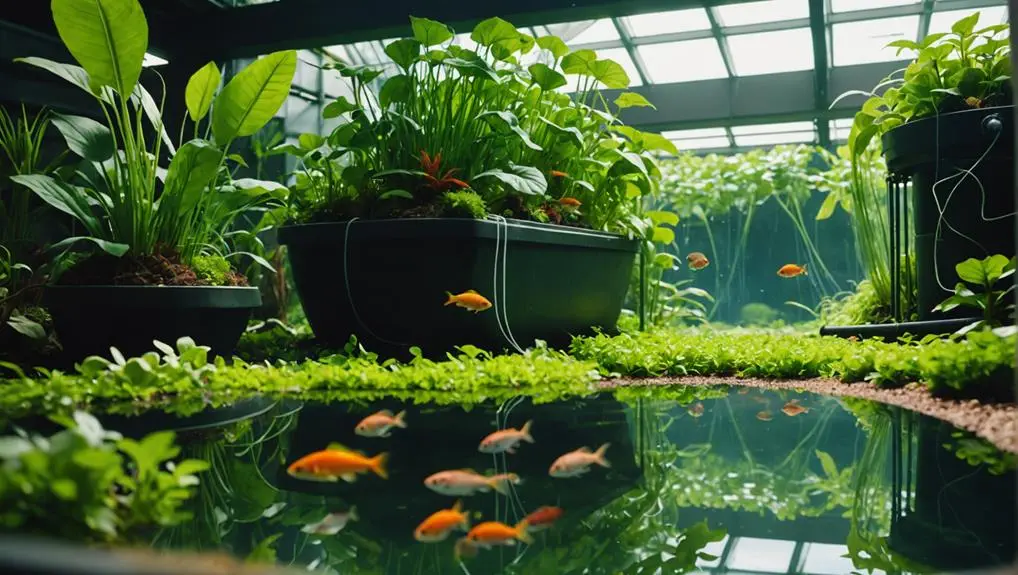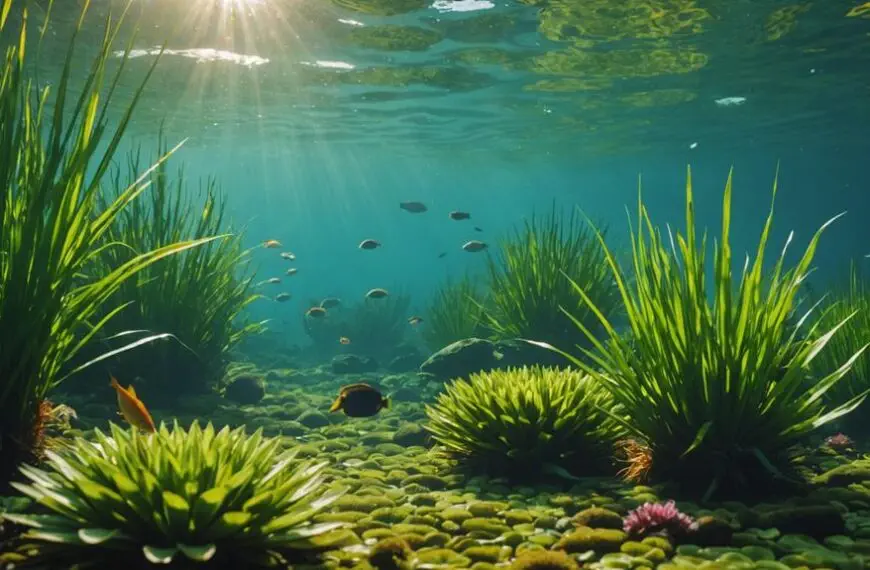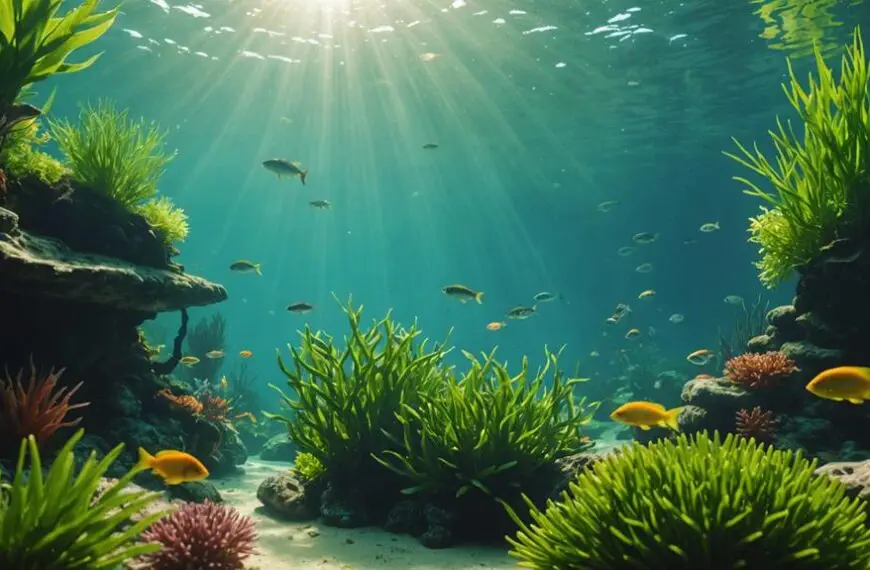Aquaponics is a game-changer for fishkeeping, blending fish farming with plant cultivation in a super efficient way. You'll notice healthier fish thanks to optimal water conditions and natural filtration that cuts down on harmful chemicals. Plus, you use up to 90% less water compared to traditional setups—now that's a win for your wallet and the planet! It encourages biodiversity, giving your fish and plants a thriving community. You'll even enjoy year-round production, ensuring you're never short on fresh food. Stick around, and you might just uncover even more benefits that could turn your fishkeeping journey into a flourishing adventure!
Contents
Enhanced Fish Health
Aquaponics systems consistently provide an exceptional environment for fish, enhancing their overall health and wellbeing. You'll find that this method creates a clean, well-maintained habitat, significantly reducing stress and disease risks compared to traditional fishkeeping.
By maintaining optimal water quality through regular monitoring, you can ensure that key parameters such as pH, ammonia, and nitrite levels remain within safe ranges, which is crucial for fish health essential test parameters. With plants and beneficial bacteria working together, these systems maintain optimal water quality, which helps keep harmful ammonia levels in check.
You might be surprised to learn that fish raised in aquaponics often exhibit faster growth rates! That's because stable water conditions and consistent nutrient availability lead to healthier specimens.
Plus, since you're avoiding harmful chemicals and synthetic treatments, you're protecting your fish from risks that can compromise their health.
Regularly monitoring your aquaponics setup fosters a deeper understanding of your fish's needs. This not only helps you provide better care but also leads to improved fish wellbeing over time.
Think of it as being the best fish parent you can be! So, if you're passionate about serving others—whether it's your family or the environment—consider the benefits of enhanced fish health in aquaponics.
You'll create a thriving ecosystem where both fish and plants flourish together!
Efficient Water Use
When it comes to keeping fish, you might be surprised to learn that aquaponics can save you a ton of water—up to 90%, in fact!
This clever system recirculates water, turning fish waste into plant food while keeping everything clean and fresh.
Water Conservation Techniques
Efficient water use is crucial in any sustainable farming system, and aquaponics excels in this area. By employing various water conservation techniques, you can significantly reduce water waste while keeping your fish and plants thriving.
Aquaponics systems are designed to recirculate water, allowing you to use up to 90% less water than traditional farming. Isn't that amazing?
Here are some effective water conservation techniques you can implement:
- Closed-loop design: This recirculates water, minimizing wastage and keeping water quality high.
- Fish waste utilization: By integrating plants, you recycle nutrients, which means fewer water changes are needed.
- Regular monitoring: Keep an eye on your system to prevent evaporation and transpiration from stealing your precious water.
- Year-round growth: Controlled environments allow you to grow food even in water-scarce areas, optimizing your resources.
Sustainable Ecosystem Benefits
By implementing aquaponics, you create a sustainable ecosystem that thrives on the synergy between fish and plants. This innovative system recycles about 90% of the water, drastically cutting down on waste compared to traditional fishkeeping methods.
Imagine using just 1/6th of the water that conventional agriculture requires—pretty impressive, right?
The magic happens through the natural filtration provided by the fish and plants working hand in hand. Fish produce waste, which becomes food for the plants, while the plants clean the water, making it healthier for your fish.
It's a win-win situation! With stable water conditions, your fish get cleaner, aerated water, promoting their overall health and happiness.
Plus, you're contributing to water conservation, a vital resource for our planet. By reducing water waste and enhancing water quality, you're not just keeping fish; you're also protecting the environment.
And let's be honest, who wouldn't want to be part of a sustainable ecosystem that benefits both fish and our world? So, dive into aquaponics, and watch your little fishy friends thrive while you do your part for Mother Earth!
Natural Filtration Process
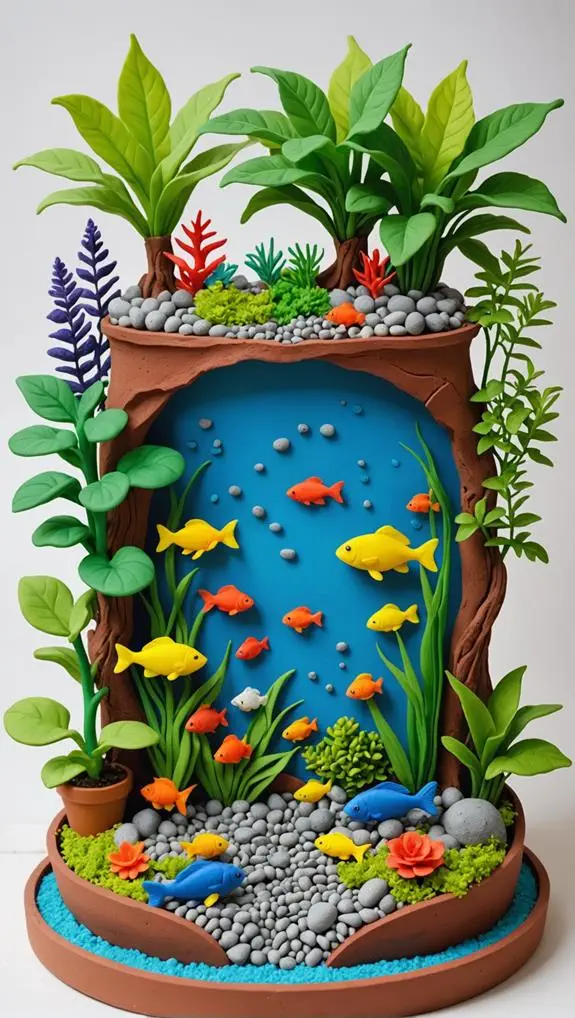
One of the most remarkable features of aquaponics is its natural filtration process, which relies on the symbiotic relationship between fish, plants, and beneficial bacteria. This system turns fish waste into a nutrient powerhouse, all while keeping water clean and healthy.
It's like a well-choreographed dance in your tank! Maintaining good water quality is essential, as regular testing helps identify contaminants and ensures optimal pH levels for aquatic life.
Here are four key benefits of this natural filtration process:
- Less Mechanical Filtration: You won't need to worry as much about complicated filters. The plants do much of the heavy lifting!
- Healthy Ecosystem: Beneficial bacteria convert harmful ammonia from fish waste into nitrates, creating a thriving environment for both fish and plants.
- Minimal Intervention: With the nitrogen cycle in play, you can enjoy your fishkeeping hobby without constant monitoring.
- Natural Waste Management: Fish waste becomes a resource instead of a problem, making your system self-sustaining.
Reduced Chemical Dependency
When you think about fishkeeping, you probably picture all those chemicals you need to keep things running smoothly.
But with aquaponics, you can kick that habit! Instead of relying on synthetic fertilizers, you'll enjoy a natural fertilizer source thanks to fish waste, creating a chemical-free ecosystem that's safer for your fish and plants alike.
Natural Fertilizer Source
Aquaponics offers a sustainable solution by harnessing fish waste as a natural fertilizer, eliminating the need for synthetic chemicals.
In this closed-loop system, you'll find that the waste produced by your fish provides essential nutrients for your plants. This means healthier growth and a greener environment!
Here are some key benefits you can enjoy:
- Natural nutrients: Fish waste contains vital elements like nitrogen, phosphorus, and potassium, giving your plants exactly what they need to thrive.
- Higher growth rates: Studies show that aquaponic systems can lead to 30-50% increased plant growth compared to traditional methods that rely on chemical fertilizers.
- Better water quality: By ditching harmful chemicals, you promote a healthier ecosystem for both your fish and plants—everyone benefits!
- Reduced carbon footprint: Aquaponics minimizes the environmental impact associated with producing and distributing agricultural chemicals, making it a win-win for you and the planet.
Chemical-Free Ecosystem
Creating a chemical-free ecosystem is one of the standout advantages of aquaponics. Imagine a world where your fish can thrive without the stress of harmful chemicals!
In aquaponics, you don't need chemical fertilizers or pesticides. Instead, fish waste provides all the nutrients needed for plant growth. This means you're harnessing natural processes that support both plants and fish health.
By eliminating synthetic chemicals, you're not just enhancing the well-being of your fish but also promoting biodiversity in your system. A balanced aquatic ecosystem doesn't just sound good; it's essential for keeping your fish happy and healthy.
Plus, with aquaponics, you recycle water efficiently, leading to cleaner water quality and fewer contaminants—something that traditional fishkeeping often struggles with.
Improved Biodiversity
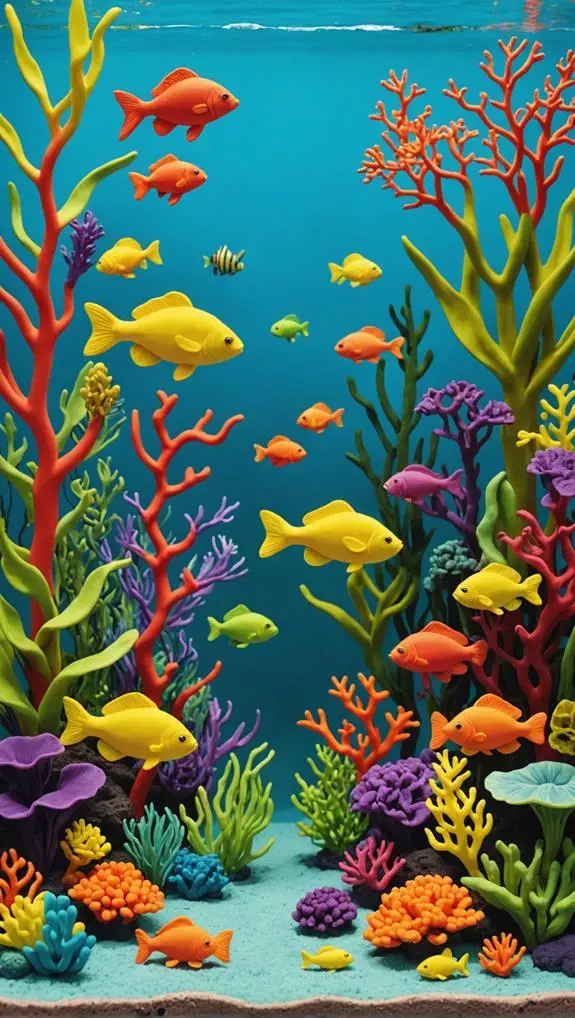
In an aquaponic system, you'll find that improved biodiversity plays a crucial role in fostering a healthier environment for both fish and plants. It's like hosting a party where everyone gets along!
Here are some ways biodiversity boosts your aquaponic setup:
- Diverse Fish Species: You can cultivate various fish species, which enhances genetic diversity and makes your system more resilient. Think of it as having a backup band for your favorite song!
- Varied Habitats: Integrating plants with fish creates different habitats. This encourages beneficial microorganisms, which help maintain healthy ecosystems.
- Pollutant Reduction: The closed-loop design reduces pollutants, allowing multiple species to thrive in harmony, just like a well-rehearsed choir.
- Refuges for Endangered Species: Aquaponics can provide safe spaces for endangered fish species, aiding in breeding and population recovery efforts. It's like giving a helping hand to those in need!
Sustainable Food Production
Combining fish farming and plant cultivation in aquaponics leads to a highly efficient method for sustainable food production.
Imagine growing vibrant plants and raising healthy fish all in one system! You can produce an average of eight times more food per acre than traditional farming. That's a game-changer for those wanting to serve communities.
What's even better? You'll use only a fraction of the water—just one-sixth of what soil-based farming requires. This makes aquaponics a fantastic option for areas struggling with water scarcity.
The fish waste acts as a natural fertilizer, giving your plants everything they need to thrive without any harmful chemicals. Talk about organic practices at their finest!
Year-Round Cultivation
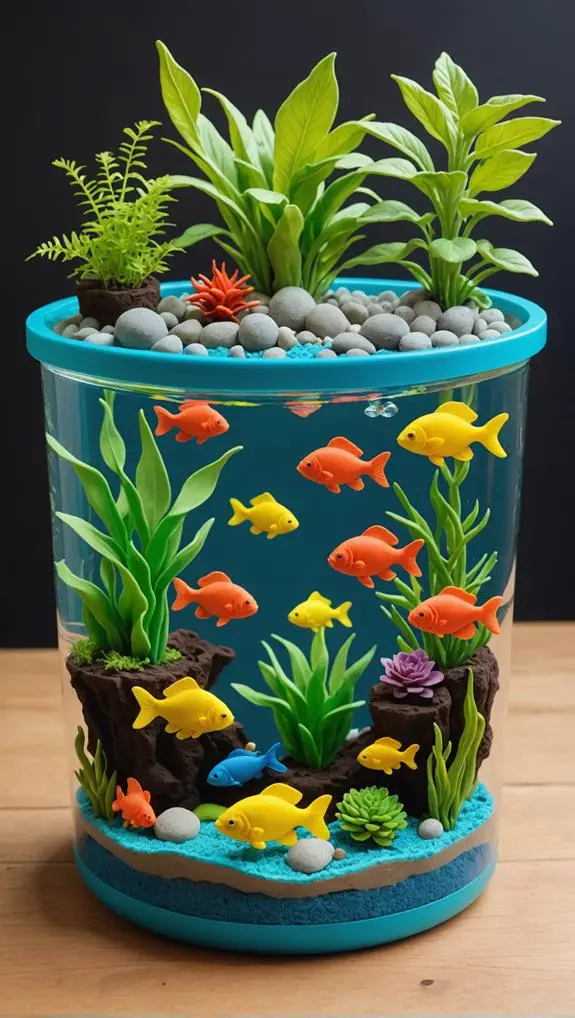
Aquaponics lets you cultivate fish and plants year-round, regardless of the weather outside.
Imagine having fresh fish and vibrant veggies at your fingertips, no matter if it's snowing or sunny! This innovative system combines aquaculture and hydroponics, creating a harmonious cycle that keeps both fish and plants thriving.
Here are some fantastic benefits of year-round cultivation:
- Consistent Production: You can enjoy a steady supply of fish and plants, which means no more seasonal shortages in your meals.
- Resource Efficiency: With aquaponics, you're using about 90% less water than traditional farming. That's a big win for sustainability!
- Nutrient-Rich Environment: Fish waste provides essential nutrients for your plants, promoting healthy growth even in those chilly winter months.
- Adaptable Fish Species: Fish like tilapia are perfect for aquaponics. They can thrive in various water temperatures, so you can keep your fishkeeping game strong all year.
Educational Opportunities
With hands-on learning experiences, aquaponics opens the door to a deeper understanding of ecosystems. You'll find that setting up an aquaponics system not only teaches you about fish and plant interactions but also sparks curiosity about ecological balance. Imagine witnessing firsthand how these two components thrive together. It's pretty cool!
Educational opportunities abound when you dive into aquaponics. Schools and community groups are embracing this sustainable agriculture method, offering programs where you can learn essential skills in resource management and food production.
You'll be preparing for a career in a field that's growing faster than a weed in your garden!
Plus, you can explore fascinating research projects on water chemistry or plant growth, making science come alive. Integrating aquaponics into STEM curricula gives you practical applications that sharpen your critical thinking and problem-solving skills.
And let's not forget the workshops! They're a fun way to learn system design and management, so you can create your very own fish and plant haven.
Frequently Asked Questions
What Are the Advantages of Aquaponics?
Aquaponics offers you sustainable farming through its closed-loop system, ensuring efficient nutrient recycling. You'll reduce water usage, cultivate diverse species, and create a balanced ecosystem, all while contributing to healthier food sources for your community.
What Is the Main Disadvantage of Aquaponics?
The main disadvantage of aquaponics lies in its system complexity. You'll face challenges like nutrient imbalance and pest management, which require consistent attention. Without proper monitoring, your plants and fish might struggle to thrive together.
How Much Water Does Aquaponics Save?
Aquaponics saves about 90% more water than traditional farming, enhancing water efficiency. This sustainable system promotes fish health while providing a continuous cycle of nutrients, ensuring both plants and fish thrive together harmoniously.
What Type of Fish Is Best for Aquaponics?
You don't need to stress about choosing fish! Focus on compatibility with tank conditions, like tilapia for hardiness or trout for cooler climates. Proper feeding techniques enhance growth, ensuring your system thrives while serving others delicious meals.
Final Thoughts
In the world of aquaponics, you've got a vibrant ecosystem right at your fingertips—like a mini underwater garden! By nurturing both fish and plants together, you're not just creating a sustainable paradise; you're also giving your fish a happier, healthier life. It's a win-win! So, dive into this rewarding journey. With a little care and creativity, you can turn your fishkeeping hobby into a flourishing adventure that benefits the planet. Ready to take the plunge?

